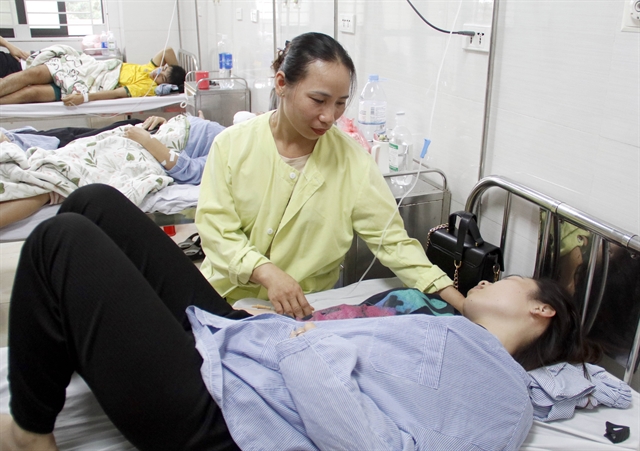 Society
Society

 |
| Patients receiving treatment at the Department of Internal Medicine – Gastroenterology, Bắc Giang Provincial General Hospital. Photo Courtesy of Bắc Giang Province |
BẮC GIANG — Bắc Giang is piloting an electronic medical records (EMR) system as part of the Government’s Project 06, which focuses on developing population data applications, electronic identification, and authentication to drive national digital transformation (2022–2025, with a vision to 2030). The Government’s Project 06 Task Force is collaborating with the Bắc Giang People’s Committee to implement the initiative.
As one of the selected pilot localities, Bắc Giang is rolling out the EMR system in two phases. The first phase prioritises infrastructure development, ensuring that every resident has a personal electronic health record to facilitate seamless referrals and follow-up appointments.
The second phase will integrate public hospitals and medical facilities with pharmacies to streamline healthcare management and data sharing. On 15 January, Bắc Giang Provincial General Hospital completed the implementation of EMRs and successfully linked its system with Bạch Mai Hospital. Other medical facilities are expected to finalise their integration by 2025.
To support this transition, Bắc Giang’s healthcare facilities have made significant investments in IT infrastructure. All 17 public hospitals and medical centres in the province have upgraded their Laboratory Information System (LIS) and Picture Archiving and Communication System (PACS).
Additionally, hospitals have installed automated patient calling and queue management systems, electronic display boards, upgraded LAN networks, servers, storage systems, firewalls, and Wi-Fi networks. To date, more than 52,300 residents—49.6 per cent of the target group—have linked their health insurance cards to electronic health records on the VNeID platform, while 83 per cent of patients now use their citizen ID cards for medical services.
However, hospitals implementing the EMR system still face challenges. High infrastructure costs for server installation and data storage remain a significant hurdle, while inconsistent network infrastructure and slow speeds fail to meet practical needs. Additionally, the EMR software, still in its early stages, requires further refinement to align with real-world operations.
Colonel Vũ Văn Tấn, Deputy Director of the Police Department for Administrative Management of Social Order at the Ministry of Public Security, emphasised that electronic health records are a crucial foundation for the EMR system. He called on Bắc Giang to intensify public awareness campaigns to ensure every resident obtains a digital health record.
As of 15 January, Bắc Giang Provincial General Hospital and Bạch Mai Hospital have officially commenced real-time data integration between their EMR systems.
Associate Professor Dr. Vũ Văn Giáp, Deputy Director of Bạch Mai Hospital, noted that after a year of EMR implementation, Bạch Mai has completed its infrastructure upgrades and is now prepared to integrate with Bắc Giang’s public healthcare facilities. This will streamline data sharing, reduce costs, and save time for patients. Bạch Mai Hospital has committed to supporting Bắc Giang in overcoming challenges and sharing its expertise in EMR deployment. VNS




